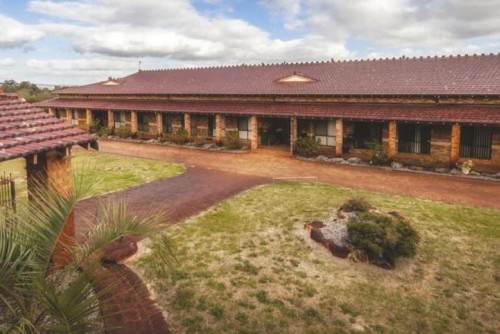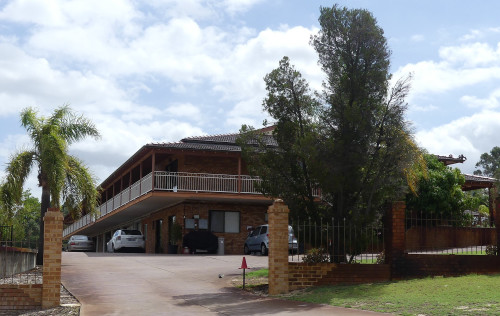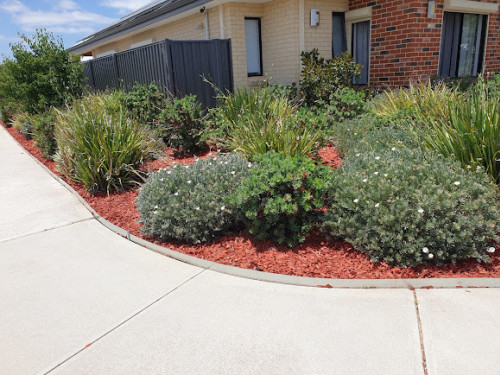






Shalom House Perth
Treatment Focus
This center primarily treats substance use disorders, helping you stabilize, create relapse-prevention plans, and connect to compassionate support.
Primary Level of Care
Offering intensive care with 24/7 monitoring, residential treatment is typically 30 days and can cover multiple levels of care. Length can range from 14 to 90 days typically.
This provider hasn't verified their profile's information. Are you the owner of this center? Claim your listing to better manage your presence on Recovery.com.
Treatment Focus
This center primarily treats substance use disorders, helping you stabilize, create relapse-prevention plans, and connect to compassionate support.
Primary Level of Care
Offering intensive care with 24/7 monitoring, residential treatment is typically 30 days and can cover multiple levels of care. Length can range from 14 to 90 days typically.
Private Pay
You pay directly for treatment out of pocket. This approach can offer enhanced privacy and flexibility, without involving insurance. Exact costs vary based on program and length of stay. Contact the center for specific details.
Shalom House Perth
Shalom House Perth
About Shalom House Perth
Set in Perth, Shalom House embraces its reputation "Australia's largest and toughest rehab." Their Christian, residential treatment program leverages their founder's recovery from meth addiction. Their program lasts 12 months or longer and includes treatment for co-occurring disorders like anxiety, depression, domestic violence, and gambling. Shalom house is accredited by Alcohol and Other Drug Human Services Standard (AODHSS). They receive a lot of press coverage.
They have 140 beds, with separate living quarters for the men and women.
Admission
Shalom House welcomes men and women from all faiths from all states and territories in Australia. They admit about 1 in 20 applicants. They don't take referrals from courts or admit individuals currently in prison.
They require individuals seeking treatment to read their website and review the terms directly on there.
Payment
Shalom House charges $500 AUD per week. For individuals on Centrelink, they offer a discount rate of $300. They don't take insurance or government funding, but they accept donations in the forms of food and clothing.
Treatment Methods
Shalom House uses a "cold turkey" abstinence-based treatment method. They don't allow smoking or vaping on the property, nor do they allow discussion of smoking or vaping on the property.
They typically don't allow medications, but they can make exceptions for anti-psychotic medications that one of their psychiatrists approves.
The program involves taking people of all faiths to church services on Fridays, Saturdays, and Sundays. The Friday services are a Pentacostal style. The Saturday services are non-denominational services at Shalom House. The Sunday services are at different churches each week in the Perth community.
The program includes occasional adventure outings to places like John Forest National Park.
Treatment Stages
Shalom House has a 5-stage treatment approach that involves work or volunteering.
Stage 1 is detox for about 3 months. During this phase, clients can't use their phones or leave the property.
Stage 2 is mapping out the client's future after leaving Shalom House. This stage happens around 12 weeks in the program, concurrently with Stage 1. After a client completes stage 2, they can leave the property on Fridays at 5 p.m. and return at 5 p.m. on the following Sundays if family picks them up.
Stage 3 allows residents to work offsite, purchase a cellphone, and leave the property. The curfew is 8:30 p.m.
Stage 4 involves building relationships in the community and mentoring newer residents. The curfew is extended to 10:30 p.m.
Stage 5 involves demonstrating life choices for life after discharge. It includes random drug tests.

Center Overview
Treatment Focus
This center primarily treats substance use disorders, helping you stabilize, create relapse-prevention plans, and connect to compassionate support.
Pricing and Program Length
Estimated Center Costs
The cost listed here ($500/week), is an estimate of program cost. Center price can vary based on program and length of stay. Contact the center for more information. Recovery.com strives for price transparency so you can make an informed decision.
Levels of Care





Your Care Options
Specializations
Christian
Through surrender and commitment to Christ, patients refocus the efforts and source of their recovery with clinical and spiritual care.
Who We Treat
Men and Women
Men and women attend treatment for addiction in a co-ed setting, going to therapy groups together to share experiences, struggles, and successes.
Approaches
Family Involvement
Providers involve family in the treatment of their loved one through family therapy, visits, or both–because addiction is a family disease.
Holistic
A non-medicinal, wellness-focused approach that aims to align the mind, body, and spirit for deep and lasting healing.
Individual Treatment
Individual care meets the needs of each patient, using personalized treatment to provide them the most relevant care and greatest chance of success.
Christian
Through surrender and commitment to Christ, patients refocus the efforts and source of their recovery with clinical and spiritual care.
Therapies
1-on-1 Counseling
Patient and therapist meet 1-on-1 to work through difficult emotions and behavioral challenges in a personal, private setting.
Conditions We Treat
Anxiety
Anxiety is a common mental health condition that can include excessive worry, panic attacks, physical tension, and increased blood pressure.
Bipolar
This mental health condition is characterized by extreme mood swings between depression, mania, and remission.
Depression
Symptoms of depression may include fatigue, a sense of numbness, and loss of interest in activities. This condition can range from mild to severe.
Gambling
Excessive, repetitive gambling causes financial and interpersonal problems. This addiction can interfere with work, friendships, and familial relationships.
Substances We Treat
Alcohol
Using alcohol as a coping mechanism, or drinking excessively throughout the week, signals an alcohol use disorder.
Benzodiazepines
Benzodiazepines are prescribed to treat anxiety and sleep issues. They are highly habit forming, and their abuse can cause mood changes and poor judgement.
Cocaine
Cocaine is a stimulant with euphoric effects. Agitation, muscle ticks, psychosis, and heart issues are common symptoms of cocaine abuse.
Drug Addiction
Drug addiction is the excessive and repetitive use of substances, despite harmful consequences to a person's life, health, and relationships.
Heroin
Heroin is a highly addictive and illegal opioid. It can cause insomnia, collapsed veins, heart issues, and additional mental health issues.
Methamphetamine
Methamphetamine, or meth, increases energy, agitation, and paranoia. Long-term use can result in severe physical and mental health issues.
Prescription Drugs
It's possible to abuse any drug, even prescribed ones. If you crave a medication, or regularly take it more than directed, you may have an addiction.
Smoking Cessation
Quitting smoking—i.e., ceasing to smoke—means giving up smoking nicotine and tobacco products. This process has very important health benefits.
Languages
Aftercare
Care Designed for Your Needs
Personal Amenities
Amenities
Special Considerations
Religion-Based Track
Patients can join faith-based recovery tracks to approach recovery with others in their faith, healing in a like-minded group with similar goals.





